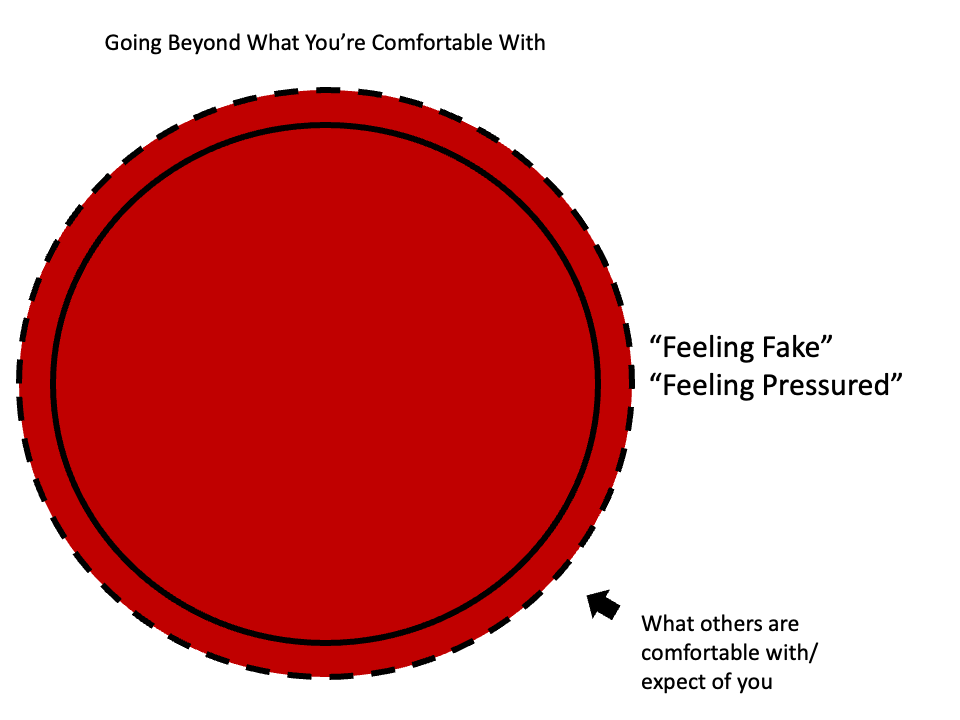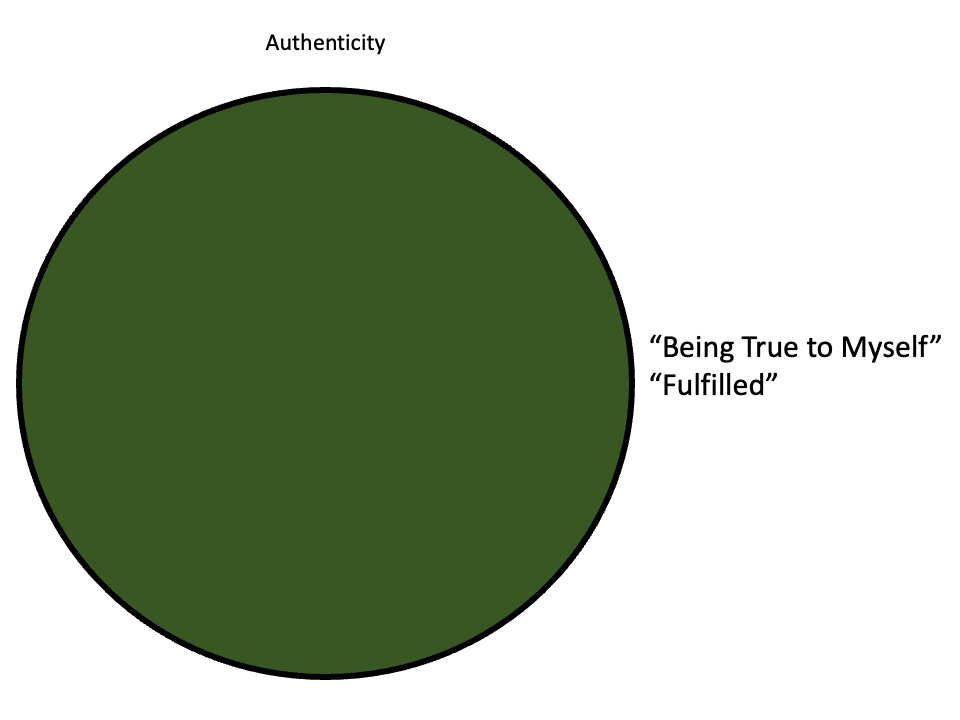The Need for Authenticity
What does it mean to be authentic? Why do we desire authenticity? And how might the individual need for authenticity fit in with the greater corporate need for authenticity in a church, community, family, or business?
Consider this article an experiment in answering and thinking about these questions. This experiment will go a lot more smoothly if some of you give your two cents, examples, feedback, and input!
Let's start with you pictured below in Figure 1. The circle represents your knowledge, what you believe to be true. Now, your knowledge could be based in reality or not... that's not really the point of this experiment. What you believe to be true is just as important as objective truth because what you believe to be true leads you to act (or not act) in certain ways.
Suicide bombers, fire and brimstone preachers, and politicians - to some extent - practice what they believe to be true, and these actions change the world around them for the better or worse. A doctor who has diagnosed you incorrectly will work based off of that diagnosis regardless of its objective truthfulness.
As we move through life, however, this circle should change. Now, of course there are some who have said things like, "I haven't changed my mind on baptism in thirty-seven years." I guess this is why they expect new believers to understand their baptism to the same degree they do... which leads to countless church camp rebaptisms, but that's an article for another time.
Perhaps this change can be illustrated like this:
The dotted line represents what you used to know while the solid line represents what you know now! Congratulations! You have grown.
But now there is a problem. Now you must decide whether or not to act upon these new beliefs. Perhaps this is a better way to run the company. This could be a potential Bible class topic. This may mean accepting couples into your church who were previously married to other people before going through a divorce.
Regardless, you have a choice to make, and moving into new territory is scary, so sometimes we hit the brakes. That might look like this:
This may feel like you aren't being yourself. "Am I a hypocrite?" you may ask.
It can be difficult to live out our beliefs in situations where we may face rejection, failure, or even the unknown. We may catastrophize or try to mind read by assuming the worse will happen or that we know what the results will be: "I'll be rejected if I do this..." "The company will have a bad quarter..." "People will leave our church..."
And these thoughts, called "cognitive distortions," sometimes lead us to procrastination or inaction, even if they aren't certainties.
This leads us to feeling inauthentic, which can produce feelings of anxiety or depression.
On the other hand, due to social pressure, such as expectations of a colleague, family member, or parishioner, we may also push ourselves beyond what we are comfortable with (See Figure 4). This can be healthy in some cases, like when Jesus or Paul challenged the disciples to take their faith a step further, but it can also be detrimental if we aren't ready for that change. Jesus, for example, told his disciples that there were some things he wanted to tell them, but they couldn't bear them yet (John 16:12; Paul wasn't so kind: Hebrews 5:11-14).
Feeling this discomfort can cause us to constrict or even retreat back into an earlier stage of thinking.
Sometimes when we're going through changes like this we can propel ahead to a new stage one day and then snap back to an earlier stage. This can make one feel like a rubber band or maybe even an accordion. One may feel confused, frustrated, or even saddened by these shifts and changes, and, in their longing for stability, may give up the efforts altogether.
Eventually, when we do find some sort of stability, however temporary it might be, we will try to act out our new beliefs, perspectives, etc. This feels good, and it looks something like this:
When we live out our core values, we feel fulfilled, and we feel like we are being truly ourselves. We feel like we are being the people God has created us to be.
If you've experienced this, then one thing you can do is try to be someone others can be authentic around. This means not expecting them to conform to your preferences, practices, or traditions. It means offering grace and being someone others feel safe with.
Paul said to be "enslaved to one other" through love (Galatians 5:13). He said that we should "regard others as better than ourselves" (Philippians 2:3). And he told the Romans and Corinthians that he would not eat meat if it caused his brother to stumble (Romans 14:15; 1 Corinthians 8:13).
These verses are unfortunately used by some to manipulate others into bending to their will, but in reality these are temporary measures to help bring someone on to maturity, not permanent stopping places for all time.
We may even use these passages to guilt ourselves into not living authentically, but, if understood correctly, these passages will encourage everyone within a congregation to adopt these attitudes. Remember, when it came to matters of liberty in Jesus, Paul wouldn't budge for a minute when some were trying to bind their practice of circumcision on Titus (Galatians 2:5).
This is where church work can get difficult. Instead of one circle, you have fifty, one hundred, or several hundred circles to consider. What is totally acceptable and preferable to everyone is represented by the green, perfectly filled section below (well... the best I could do without a "fill" tool). One of my friends suggested drawing a smaller circle off to the side with the words, "Mine! Mine! Mine!" out to the side. That might make it into future versions of this...
So what's the solution? How can we expand the green... even if it gets out of some of the circles' comfort zone? The lack of a silver bullet solution may come from the fact that certain of these differences are simply incompatible. If someone prefers a cappella music and someone else prefers instrumental music, it is impossible to have both simultaneously (although, I guess with earphones for every person and strategic seating arrangements it isn't technically impossible...).
Some churches have two services, and this may work for some places, but what do you do in a situation where there are only fifty or sixty people? Have one service with 30 and another service with 20? That doesn't seem reasonable does it?
A lot of the differences that divide churches come from different ideas about what should happen within a one-hour worship service. In the business world, this might look like a certain procedure or operation.
This one-hour worship service is divisive among some groups because of this idea that the worship service must follow a certain pattern or blueprint (see my latest podcast episode). Even if someone rejects this principle in theory, it can be difficult and even painful to relinquish old habits that are comfortable to us.
So, what do we do?
Perhaps we need to rethink the entire paradigm. Perhaps divisions are inherent within the system we are currently working in. It could be that subscribing to the very idea of a mandated one-hour Sunday worship service is setting us up for failure from the very beginning.
If we could emphasize service, small groups (house churches), and regular periods of fellowship and prayer, then the pressure to get a Sunday service "right" is greatly diminished. One week, a church could worship with one style while opting for a different style the next week. Yes, this may be uncomfortable for some, but if we are meeting and serving together regularly, then there is less focus on what happens in that one hour on Sunday.
In smaller groups, the potential of giving everyone space to be authentic increases, which means that people won't feel like they're "giving up" too much during the sixty minutes on Sunday morning.
This would require some rethinking, yes. And this format is not without its own challenges. But I'm not sure what else can be done. This isn't a problem that can be solved with careful interpretation of a few passages; it will require a complete rework of what we think about when we think about church and worship.
Some solve this problem by bouncing from church to church until they find a fit. Others solve this problem by not going to church at all. Others demand conformity to their way, what they falsely call God's way, and years of church division testify to the wickedness of that philosophy. It seems to me, then, that some reworking is in order.
It all boils down to a couple of points: each person must adopt the "mind of Christ" in Philippians 2, and leadership teams must deemphasize the need to get Sunday worship "right" (i.e. rejecting the "pattern" of worship or the "regulative principle").
What are your thoughts? Ideas? Suggestions? Critiques?
If you'd like to learn more about the "five acts of worship" way of thinking, listen to my latest podcast:






